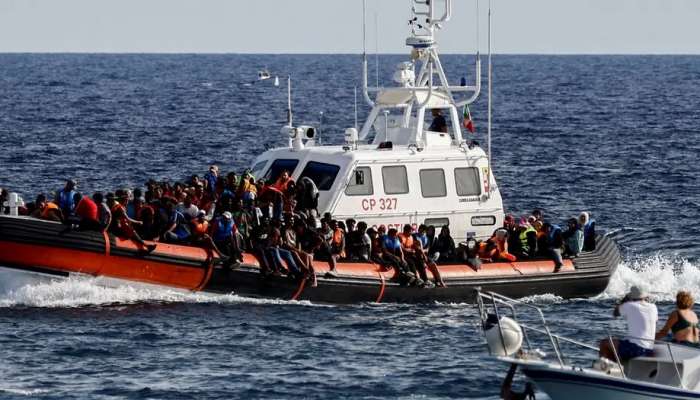
Brussels: The number of asylum applications to the European Union has risen over the past two years. While there were just under 1 million in 2022, the European Union Agency for Asylum has predicted that this mark could now have hit the highest number since 2015, the year in which a especially large number of people came to Europe and former German Chancellor Angela Merkel coined the slogan: "We can do this!"
Of those seeking protection, more than 350,000 entered the EU irregularly (without permission) in the first 11 months of 2023, according to EU border protection agency Frontex.
But irregular migration only accounts for a fraction of all migration to the 27 member states, according to the EU Commission. By contrast, almost 3.5 million people migrated to the EU in 2022 as refugees with asylum status, or to pursue education or a job, for example.
Experts expect that many people will continue to make the dangerous, and sometimes deadly, journey to Europe in 2024. Catherine Woollard, director of the European Council on Refugees and Exiles, told DW that record numbers of people are currently fleeing worldwide. A small proportion of them will seek protection in the EU.
"It is likely that next year there will be somewhere up to a million people be seeking protection [in Europe], and most of them actually in need of protection," said Woollard.
David Kipp, who works on German and European migration policy at the German Institute for International and Security Affairs in Berlin, said there were "no signs of a trend reversal at the moment" because the number of crises are increasing worldwide.
Still, accommodating these migrants is manageable, Woollard said, pointing to the example of the way Ukrainians who fled to the EU in 2022 were integrated. According to the European Council, around 4.2 million Ukrainians received temporary protection in the EU in September 2023. Rather than panic about numbers, Woollard suggested that the functionality of European asylum systems be improved.
In mid-December, the European Parliament and 27 member states agreed on a far-reaching reform to EU migration and asylum policy. Before it can take force, it must still be formally adopted by the member states and the EU Parliament in the first half of 2024, pending the clarification of technical details.
Kipp expects the new laws to be implemented in two to three years. For the time being, the symbolic agreement, which he called a "political liberation" for those involved, is in the foreground.
The reform provides for stricter procedures, such as how asylum-seekers with little chance of success will be received at borders. They are to be housed in detention-like conditions — with no exceptions for families with children. A mandatory solidarity mechanism between member states is also set to ease the burden on border countries. It dictates that if a member state refuses to accept asylum-seekers, it must make up for this refusal with financial compensation or other contributions.
A number of human rights organisations have sharply criticized the planned regulations. Woollard is among those who fear that the already fragile right to asylum will be eroded.
"One of the major challenges is that the pact won't resolve some of the key problems," she said. "Because of the increased responsibility of the countries at the borders, which is part of the pact, we expect to see them responding by engaging in more pushbacks and denials of access at the borders."
In terms of feasibility, Kipp said it remains to be seen just how functional the new proposals will be. For example, it remains unclear whether camps would have to be built to accommodate the new border procedures, and how these could be designed in a humane fashion.
The European Union reached a migration agreement with Tunisia in the summer of 2023. In exchange for over €1 billion (about $1.1 billion) in financial aid, the country would prevent migrants from crossing the Mediterranean for Europe.
However, the agreement has yet to yield any significant results. Meanwhile, relations have reached a standstill in other respects, when in October Tunisian President Kais Saied rejected a multimillion euro payment from the EU as a "handout."
Migration diplomacy will become even more important in 2024, predicted Kipp. The Tunisia deal isn't the EU's first attempt to motivate third countries to keep migrants out of Europe. Similar agreements had already been reached with Turkey and Libya, and another such deal is in the works with Egypt.
But these arrangements are highly controversial from a human rights perspective. What's more, they're not very successful, said Woollard. "There is no real interest or desire from other countries to do Europe's job for it," she added.
The planned border procedures will also require further cooperation with countries that take in rejected asylum-seekers, explained Kipp. But transit countries have no real interest in taking back people who have been deported from third countries.
Unofficially, it's said in Brussels that an asylum policy agreement was needed to slow the rise of right-wing populists.
European parliamentary elections are due to take place in June, and migration has often played a major political role in many member state polls — most recently in the Netherlands, where far-right lawmaker Geert Wilders' anti-immigration Party for Freedom emerged victorious.
However, experts like Kipp are sceptical that the new asylum rules can help to make the issue less explosive, because the reality is that migration will continue.